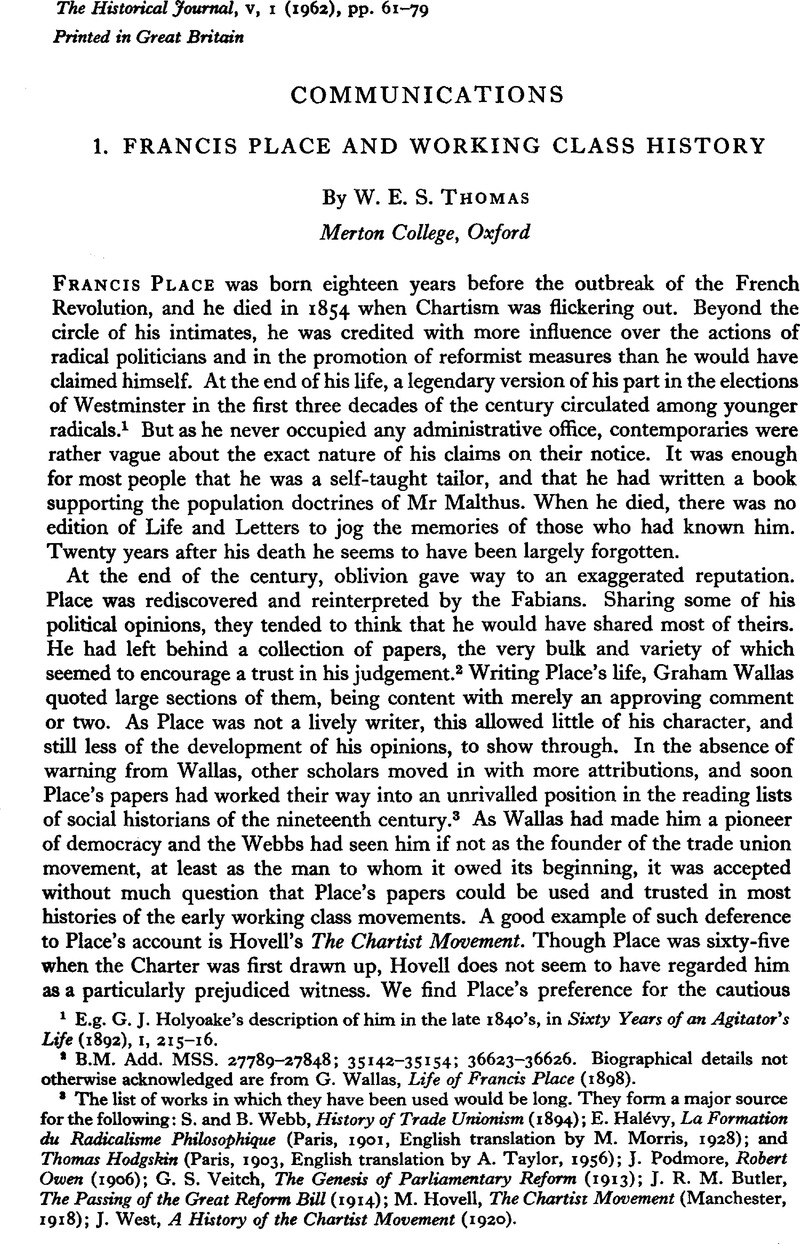Article contents
1. Francis Place and Working Class History
Published online by Cambridge University Press: 11 February 2009
Abstract

Information
- Type
- Communications
- Information
- Copyright
- Copyright © Cambridge University Press 1962
References
1 E.g. Holyoake's, G. J.description of him in the late 1840's, in Sixty Years of an Agitator's Life (1892), 1, 215–16.Google Scholar
2 B.M. Add. MSS. 27789–27848; 35142–35154; 36623–36626. Biographical details not otherwise acknowledged are from Wallas, G., Life of Francis Place(1898).Google Scholar
3 The list of works in which they have been used would be long. They form a major source for the following: , S. and Webb, B., History of Trade Unionism(1894)Google Scholar; Halévy, E., La Formation du Radicalisme Philosophique (Paris, 1901, English translation by M. Morris, 1928)Google Scholar; and Thomas Hodgskin(Paris, 1903, English translation by A. Taylor, 1956); Podmore, J., Robert Owen(1906)Google Scholar; Veitch, G. S., The Genesis of Parliamentary Reform(1913)Google Scholar; Butler, J. R. M., The Passing of the Great Reform Bill(1914)Google Scholar; Hovell, M., The Chartist Movement (Manchester, 1918)Google Scholar; West, J., A History of the Chartist Movement(1920).Google Scholar
4 B.M. Add. MSS. 35151, fo. 27. Place's article on the address of the London Working Men's Association, Nov. 1837.
5 Ibid. 27823, fo. 67.
6 Ibid. 35149, fo. 251, Place, to Harrison, S. (undated), 12 1833.Google Scholar
7 Ibid. 35145, fo. 108 f., Place, to Hume, Joseph, 25 10 1829.Google Scholar
8 Halévy, , op. cit. (English transl.), 187–90.Google Scholar
9 James Mill to Place, B.M. Add. MSS. 35153, fo. 29, 6 Dec. 1817, and 35152, fo. 220, 8 Oct. 1816.
10 B.M. Add. MSS. 35145, fos. 80–94, correspondence between Place and Bowring, editor of the Westminster Review.
11 As a guide, I am indebted to Smith, K., The Malthusian Controversy(1951).Google Scholar Godwin's first reply to Malthus was in Thoughts Occasioned by the Perusal of Dr Parr's Spital Sermon (1800); his second was On Population (1820). For the statistical methods used in these works see Griffith's, G. T.Population Problems in the Age of Malthus (Cambridge, 1925).Google Scholar
12 1822. Facsimile ed. Himes, N. E. (1930).Google Scholar
13 B.M. Add. MSS. 35145, fos. 37–69, which contains all Place's correspondence with Godwin, and his account of the transaction.
14 Illustrations and Proofs, 270.
15 Ibid. 39.
16 Essay on the Principle of Population(1st edn. 1798), edited by Bonar, J. (1926), p. 353.Google Scholar
17 Cobbett's criticism appeared in his Weekly Political Register, 8 May 1819; for Hazlitt's three letters to the same of 1807, see Works, ed. Howe, P. P. (1930), I, 176–363.Google Scholar
18 Illustrations and Proofs, 155.
19 B.M. Add. MSS. 35149, fo. 189, 8 Sept. 1832.
20 Ibid. 35150, fos. 80–4, a pamphlet written in Oct. 1835 for J. A. Roebuck, in the form of a letter to James Turner, editor of the Poor Man's Guardian.
21 B.M. Add. MSS. 35148, fo. 40, Place to Hume, 7 Jan. 1830.
22 B.M. Add MSS. 27809, fo. 52, article in Hone's Reformist Register, Feb 1817.
23 B.M. Add. MSS. 27791, fo. 72.
24 Spectator, 10 Apr 1831.
25 B.M. Add. MSS. 27789, fos. 338–9.
26 Ibid. 35149, fos. 153–7.
27 Ibid. 35150, fos. 35–45, Place, to Hume, , 2 05 1835.Google Scholar
28 Ibid. 35150, fos. 128–31.
29 Ibid. 35150, fo. 133, Place, to Hume, , copy wrongly dated 30 07 1836.Google Scholar
30 Ibid. 35151, fo. 36.
31 B.M. Add. MSS. 27810.
32 Ibid. fo. 109.
33 Ibid. fo. 94, Place, to Harrison, S., 15 02 1842.Google Scholar
34 As Harriet Grote admitted when she read the Memoirs: ‘I never quit your personal society without a certain measure of exhilaration, & encouragement—your written society on the contrary, casts me into a slough of distaste and dislike towards the species.’ B.M. Add. MSS. 35144, fo. 364.
35 Quoted from Wallas, , op. cit. 352.Google Scholar
- 6
- Cited by

